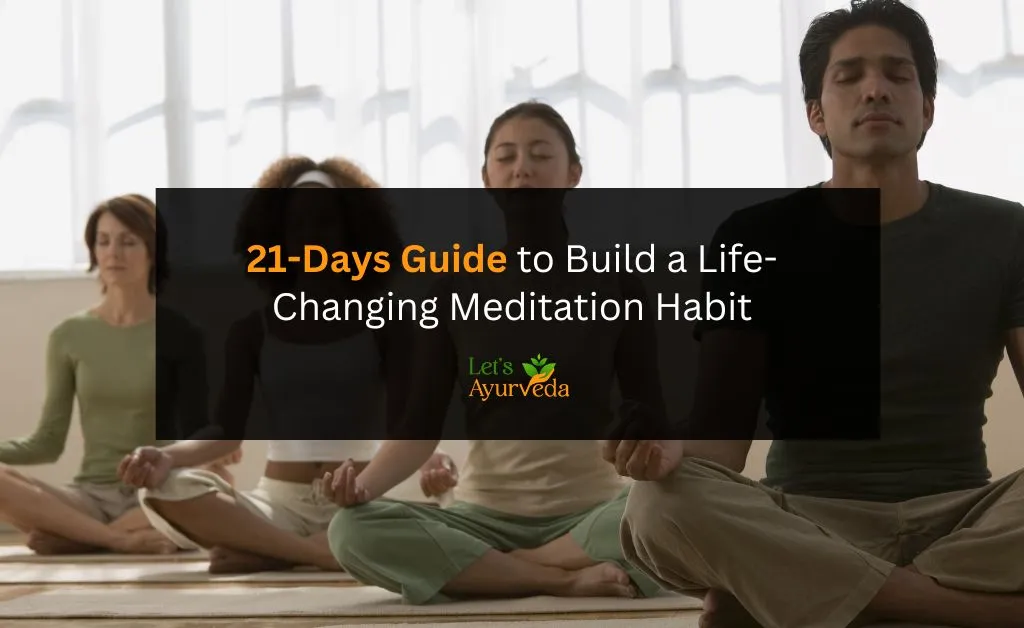Meditation can transform your life. It’s not just about sitting still; it’s about creating mental clarity, emotional stability, and a greater sense of purpose. But building a meditation habit takes commitment. If you’ve struggled to make meditation part of your daily routine, this step-by-step guide will show you how to establish the habit in just 21 days.
Let’s break it down so you can start—and stick to—this life-changing practice.
Why 21 Days?
Psychologists suggest it takes about 21 days to form a habit. While this isn’t a one-size-fits-all timeline, it’s an achievable starting point. A study from the European Journal of Social Psychology found that, on average, it takes 66 days for a behavior to become automatic. However, consistent effort over three weeks is enough to establish a foundation.
Benefits of Meditation: A Quick Reminder
Before diving into the plan, let’s revisit why meditation matters:
-
Stress Relief: Reduces cortisol, the stress hormone.
-
Improved Focus: Boosts concentration and attention span.
-
Better Sleep: Promotes relaxation and reduces insomnia.
-
Emotional Health: Enhances mood and reduces anxiety.
-
Physical Benefits: Lowers blood pressure and improves heart health.
Incorporating meditation into your life isn’t just a mental health boost—it’s a full-body investment.
Day-by-Day Plan: Building Your Meditation Habit
Week 1: Start Small, Stay Consistent
The goal this week is to create space in your routine for meditation.
Day 1: Set Your Intention
-
Write down why you want to meditate.
-
Example: "I want to feel less stressed and more focused."
-
Commit to 2-5 minutes of meditation today.
Day 2-3: Choose a Time and Place
-
Pick a consistent time—morning, lunch, or evening.
-
Find a quiet space where you won’t be disturbed.
-
Sit comfortably, close your eyes, and focus on your breath.
Day 4-5: Use a Timer
-
Set a timer for 5 minutes to avoid distractions.
-
Focus on deep, steady breaths: Inhale for 4 counts, exhale for 6.
Day 6: Try Guided Meditation
-
Use apps like Headspace, Insight Timer, or Calm.
-
Guided meditations can ease you into the practice.
Day 7: Reflect on Your Progress
-
Journal about how you feel after meditating for a week.
-
Notice any small changes in your mood, focus, or stress levels.
Week 2: Build Momentum
Now that you’ve established a routine, it’s time to deepen your practice.
Day 8-10: Increase Your Time
-
Add 2-3 minutes to your sessions each day.
-
Aim for 7-10 minutes by the end of the week.
Day 11: Focus on Gratitude
-
Spend 2 minutes of your session reflecting on things you’re grateful for.
-
Gratitude boosts positivity and strengthens your mental health.
Day 12: Use a Mantra
-
Repeat a simple word or phrase like “peace” or “I am calm.”
-
Mantras help anchor your focus and prevent wandering thoughts.
Day 13: Experiment with Techniques
-
Try mindfulness, body scans, or visualization.
-
Example: Visualize a calming beach or forest to center your thoughts.
Day 14: Celebrate Small Wins
-
Treat yourself for sticking to your habit for two weeks.
-
Reflect on your progress and any positive changes you’ve noticed.
Week 3: Cement the Habit
By now, meditation should feel like part of your routine. This week focuses on deepening the practice and reaping its benefits.
Day 15: Meditate for 15 Minutes
-
If you’ve been consistent, increasing your time should feel natural.
Day 16-17: Address Challenges
-
Struggling with distractions? It’s normal.
-
Acknowledge wandering thoughts, then gently return to your breath.
Day 18: Meditate With a Group
-
Join a local meditation class or invite friends to practice together.
-
Community can enhance accountability and motivation.
Day 19: Focus on Breathing Patterns
-
Try box breathing: Inhale for 4 counts, hold for 4, exhale for 4, and pause for 4.
-
This technique calms the nervous system.
Day 20: Reflect on Long-Term Goals
-
Visualize how meditation fits into your future life.
-
Write down what you’ve learned about yourself during the process.
Day 21: Commit for Life
-
Celebrate completing 21 days of meditation.
-
Decide how you’ll maintain your practice moving forward.
Common Challenges and How to Overcome Them
-
“I Don’t Have Time”
-
Solution: Start with just 2 minutes. Everyone has 120 seconds to spare.
-
-
“I Can’t Sit Still”
-
Solution: Try walking meditation or focus on a mantra.
-
-
“My Mind Keeps Wandering”
-
Solution: It’s normal. When it happens, gently refocus on your breath.
-
Tips for Staying Consistent After 21 Days
-
Create Triggers
-
Pair meditation with existing habits, like brushing your teeth or drinking tea.
-
-
Track Your Progress
-
Use a habit tracker app or a journal to record your daily practice.
-
-
Reward Yourself
-
Small rewards reinforce your commitment. Treat yourself to something you love after meditating consistently for a week.
-
-
Stay Curious
-
Explore new meditation styles or attend workshops to keep things fresh.
-
The Science of Meditation
Research backs up the power of meditation:
-
Stress Reduction: A 2014 study found mindfulness meditation reduces psychological stress significantly.
-
Brain Health: Studies show that meditation increases gray matter density in areas related to learning and memory.
-
Focus and Attention: Meditation improves attention span, with one study revealing that just two weeks of meditation enhanced participants’ ability to focus on tasks.
Your Next Steps
Meditation isn’t just a habit; it’s a skill. The more you practice, the better you’ll get. Building a meditation habit in 21 days is achievable, but it’s only the beginning of a lifelong journey.
Start small, stay consistent, and enjoy the transformation. What starts as 2 minutes of silence can grow into a practice that brings calm, clarity, and focus into every area of your life.
Take the first step today—your future self will thank you.
Also Read: The 5 Biggest Myths About Meditation (And the Truth Behind Them)






